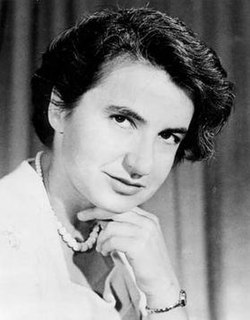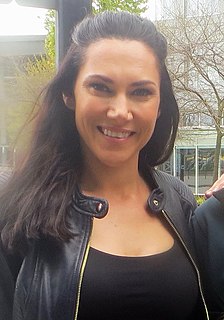A Quote by Rosalind Franklin
You look at science (or at least talk of it) as some sort of demoralising invention of man, something apart from real life, and which must be cautiously guarded and kept separate from everyday existence. But science and everyday life cannot and should not be separated. Science, for me, gives a partial explanation for life. In so far as it goes, it is based on fact, experience and experiment.
Related Quotes
The belief that politics can be scientific must inevitably produce tyrannies. Politics cannot be a science, because in politics theory and practice cannot be separated, and the sciences depend upon their separation. Empirical politics must be kept in bounds by democratic institutions, which leave it up to the subjects of the experiment to say whether it shall be tried, and to stop it if they dislike it, because, in politics, there is a distinction, unknown to science, between Truth and Justice.
He is not a true man of science who does not bring some sympathy to his studies, and expect to learn something by behavior as well as by application. It is childish to rest in the discovery of mere coincidences, or of partial and extraneous laws. The study of geometry is a petty and idle exercise of the mind, if it is applied to no larger system than the starry one. Mathematics should be mixed not only with physics but with ethics; that is mixed mathematics. The fact which interests us most is the life of the naturalist. The purest science is still biographical.
One of the strongest motives that leads men to art and science is escape from everyday life with its painful crudity and hopeless dreariness. Such men make this cosmos and its construction the pivot of their emotional life, in order to find the peace and security which they cannot find in the narrow whirlpool of personal experience.
For this knowledge of right living, we have sought a new name... . As theology is the science of religious life, and biology the science of [physical] life ... so let Oekology be henceforth the science of [our] normal lives ... the worthiest of all the applied sciences which teaches the principles on which to found... healthy... and happy life.
Since the show [Helix] is based in real science, there are real-life epidemic scares out there, throughout history, where there are these huge viruses that have wiped out huge populations. So, we're dealing with something that the CDC hasn't seen before, but it comes from a virus. That's something that's based in reality, and then you put the science fiction on that and it's a really interesting combination.
What is necessary for 'the very existence of science,' and what the characteristics of nature are, are not to be determined by pompous preconditions, they are determined always by the material with which we work, by nature herself. We look, and we see what we find, and we cannot say ahead of time successfully what it is going to look like. ... It is necessary for the very existence of science that minds exist which do not allow that nature must satisfy some preconceived conditions.
In vain do science and philosophy pose as the arbiters of the human mind, of which they are in fact only the servants. Religion has provided a conception of life, and science travels in the beaten path. Religion reveals the meaning of life, and science only applies this meaning to the course of circumstances.
Statistics is the most important science in the whole world: for upon it depends the practical application of every other science and of every art: the one science essential to all political and social administration, all education, all organization based on experience, for it only gives results of our experience.
One cannot ignore half of life for the purposes of science, and then claim that the results of science give a full and adequate picture of the meaning of life. All discussions of 'life' which begin with a description of man's place on a speck of matter in space, in an endless evolutionary scale, are bound to be half-measures, because they leave out most of the experiences which are important to use as human beings.
The most remarkable discovery made by scientists is science itself. The discovery must be compared in importance with the invention of cave-painting and of writing. Like these earlier human creations, science is an attempt to control our surroundings by entering into them and understanding them from inside. And like them, science has surely made a critical step in human development which cannot be reversed. We cannot conceive a future society without science.


































